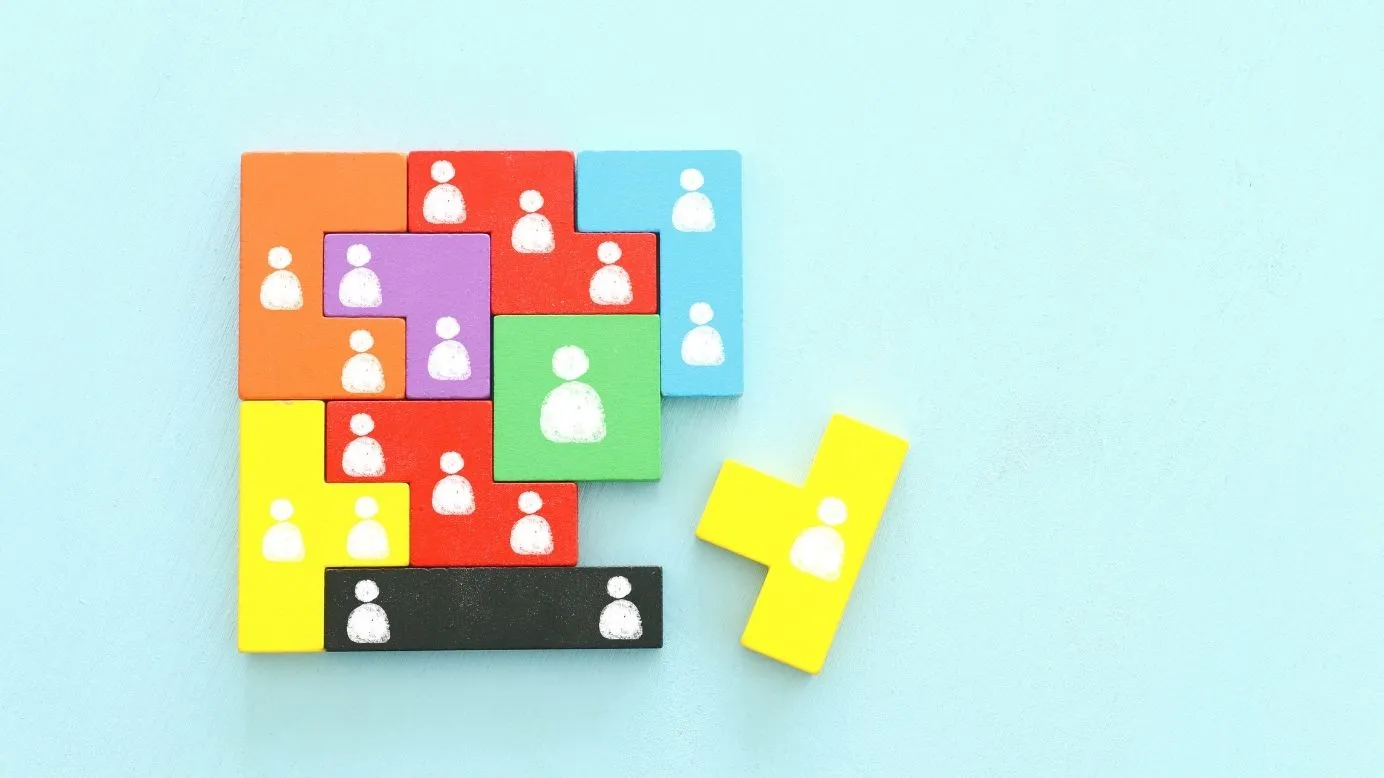On this page
- How do you do (it)?
- What is the best way to build organizational culture?
- Signs that indicate it’s time for a cultural transformation
- Yes, it’s time to change. But what, exactly?
- Levers of organizational culture transformation
- The role of a leader in shaping culture
- How to build a strong organizational culture: The 2025 playbook
- Keep checking for the pulse: Deploy surveys and focus groups strategically
- Empuls: Where culture meets engagement
- Build the journey, not the destination.
In an era where businesses are constantly evolving to stay ahead, building strong organizational culture has become more than just an HR initiative—it’s a strategic necessity. A thriving culture is the foundation that keeps employees engaged, motivated, and aligned with a company’s vision. Without it, even the best strategies can falter.
With business transformation emerging as the definitive buzzword for growth leaders in the disruption-driven era following the pandemic, the need to leverage human capital has never been more urgent. The companies that succeed are those that recognize employees as their biggest asset and invest in a culture that fosters collaboration, innovation, and long-term commitment.
Those same growth leaders, of course, also acknowledge that it is easier said than done if, in the past, they did not prioritize building a strong company culture that puts people first. In this context, organizational culture reasserts its unassailable position as a critical business lever.
The role and the importance of organizational culture are well documented across a vast body of literature. However, the real challenge lies in how to build a strong organizational culture—one that adapts to change, aligns with business goals, and resonates with employees at every level. The means to arrive at that end, however, have been many, with different organizations taking varied approaches to shape their workplace culture.
How do you do (it)?
As they (don't always) say, execution eats planning for breakfast. Executing a winning business strategy requires your entire workforce to move in lockstep, guided by common beliefs and zeal and unified towards a common purpose. In short, it requires the correct form of culture - one that knits your teams together and generates the outcomes you want.
➼ 59% of survey respondents believed organizational structure is where the big shift is taking place.
➼ 42% felt flexibility was a top emerging priority for employees.
➼ 52% confided that their readiness to reimagine organizational structure with ease was low.
➼ Not surprisingly, 33% felt that employee productivity has reduced.
The big goal for leaders today is to build a dynamic, distributed, and inclusive organizational design, spurred on by 'whole leadership.' Do they have it in them? How they build, nurture and scale, their culture ecosystem will decide that.
What is the best way to build organizational culture?
Culture doesn't build itself. Planting, watering, and inspiring it every day - is everybody's business.
Culture is a living, breathing entity. It is dependent on the active choices we make at work every day. What makes it unique from the other business assets is that it manifests in the people of a company - as opposed to, say, its strategy deck, funding portfolio, or policy file - all of which can sometimes be passive or dormant elements.
People, however, are never 'passive,' even when they are not at their dynamic or expressive best. They can be recharged and reinforced through strategic and timely nudges, incentives, and interventions (rewards and reprimands), making culture something you can consciously and actively influence.
Unbeknownst to most, culture itself is constantly interacting with, and adapting to, the external and internal environment - trying to find windows and opportunities to maintain continuity.
The flipside: This makes culture vulnerable and 'impressionable' to strong forces. Therefore, keeping it 'in its lane' becomes an essential goal for leaders.
That said, controlling culture is easier said than done. While most leaders come versed in strategy and planning, they meet their Waterloo regarding culture. This is understandable since culture isn't measurable with the five senses or quantifiable on an excel sheet.
With its moorings in unspoken conduct, patterns and norms, it remains an (often) inscrutable and (always) elusive animal to trap and tame.
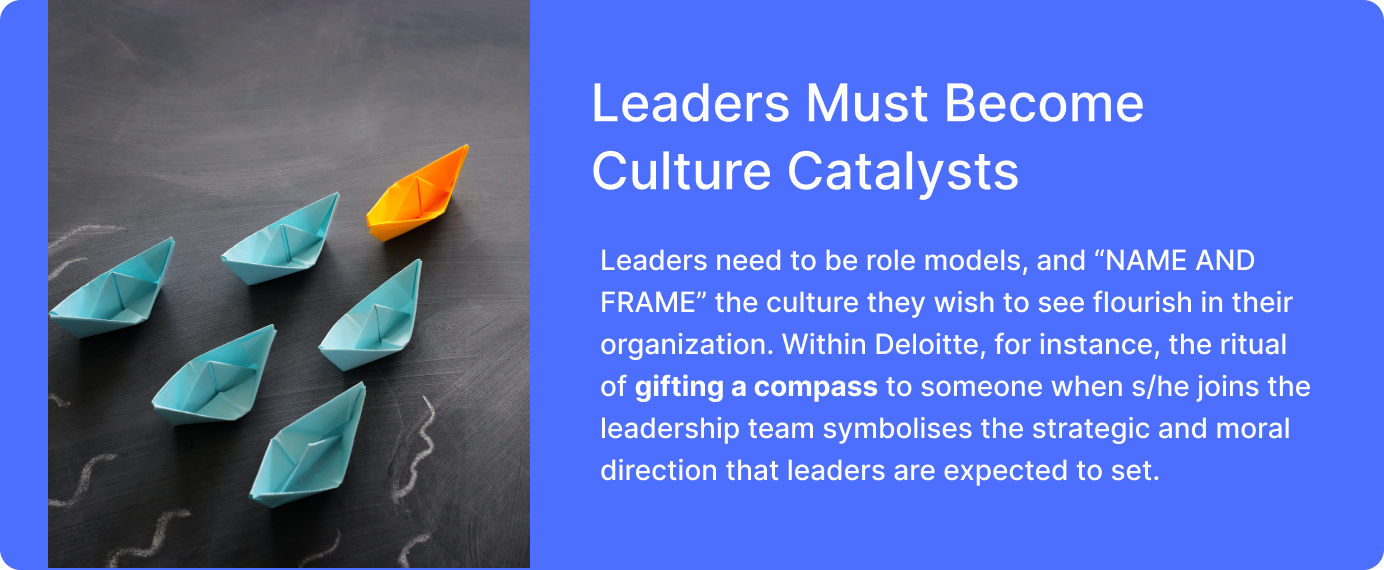
Signs that indicate it’s time for a cultural transformation
As a living and breathing entity, culture is just like us - it can run into a bout of ill health every once in a while. However, it's important to understand that meltdowns usually don't happen overnight - they are the result of the systematic erosion of the values, goals, and forces that hold the team together over the journey.
Long before a cultural matrix reaches the point of breakdown, it usually sends tell-tale hints and warning signals. It is up to culture custodians to stay sufficiently agile and trained to identify and acknowledge them and intervene with the proper response at the right time.
Whether it an ambitious effort at the change that isn't quite going as per plan, a merger or acquisition that has left employees confused about the 'big purpose,' or a stinker of a review on Glassdoor, if you are alert, it shouldn't be difficult to spot such threats to your culture and act before they reach boiling point.
Here are some signs that tell you it may be time to review and revamp your organizational culture framework:
- Your brand identity in the marketplace is getting blurred. You are not featuring in conversations that matter - certainly not as often as you might want to.
- And, when you do feature in the public discourse, it's not for the reasons you would ideally have liked.
- Reviews, ratings, and feedback are uncharitable.
- You are losing top talent to rivals.
- The leadership and the rest of the organization don't agree on fundamental issues.
- Workers are not greeting new company initiatives with the enthusiasm of yore.
- The workplace has turned toxic: Morale is down, new joiners feel quarantined, employees don't care about outcomes anymore, your best guys have turned silent.
Yes, it’s time to change. But what, exactly?
Where do you begin? Cultural attributes drive business strategy. Deloitte's global culture model highlights eight dimensions where leaders must make conscious choices and decisions to realign culture with their business goals.
Here's where your focus must go when it's time to adjust the sails:
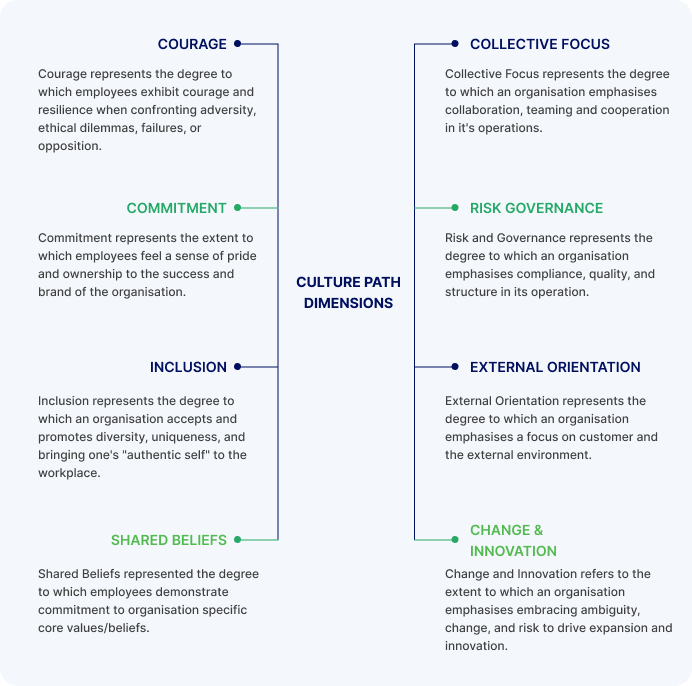
Levers of organizational culture transformation
For organizational culture to alter course mid-air, there are some specific areas where disruption must happen.
Leaders must spell out the target and fully integrate them with business initiatives. 'People Practises' must, on its part, adopt it holistically - in letter and spirit.
Business and operational processes must take the momentum ahead. Infrastructure and systems must support the journey at every step. And all thought and action - at every given moment - must be mapped forward to the overarching purpose of the organizational journey.
Below, Deloitte attempts to optimize culture re-engineering through a five-lever approach.
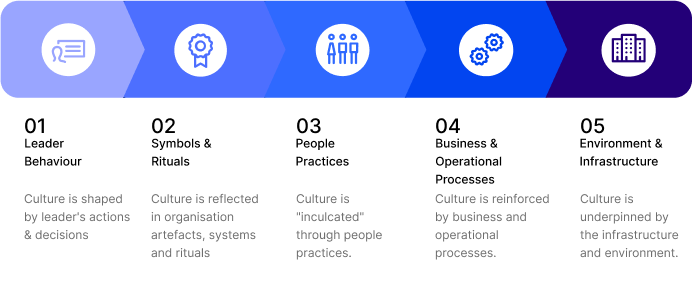
The role of a leader in shaping culture
A leader sets the tone for organizational culture. Whether through hands-on collaboration or structured management, their behavior signals how things work. A visible, approachable leader fosters openness, while a closed-door approach can stifle communication.
Leaders also shape how rewards and recognition flow. If efforts aren’t acknowledged fairly, employees disengage. Culture begins at the top—and leaders influence how it's defined, lived, and evolved.
Leading with ethics
Great leaders don’t just drive performance—they uphold values. Ethics in leadership aren't about universal agreement but about consistency, fairness, and clarity. Even if not everyone shares the same viewpoint, they’ll respect a leader who stands by a clear, inclusive code of ethics.
Unethical or vague values, on the other hand, confuse teams and damage trust. A leader's integrity, transparency, and example become the foundation of a respected workplace.
Leading through crisis
It’s easy to lead in good times—but a crisis defines true leadership. When things go wrong, employees look to leaders for strength, guidance, and decisive action. Dodging tough decisions weakens confidence. Facing challenges head-on builds lasting credibility and alignment.
Driving cultural change
Company culture must evolve with time. When change is needed, it’s the leader’s responsibility to drive it—not from the sidelines, but from the front. Change is uncomfortable, but leaders must model the behaviors and mindsets they want others to adopt.
Employees resist what leaders don’t believe in. To shift a culture, leaders must live the change themselves.
Doing the hard things
Leadership often means personal discomfort—sacrificing preferences, adapting to new tools, or following others' advice when it’s in the company’s best interest. Great leaders don’t cling to ego; they do what’s best for the mission, even when it’s not easy.
How to build a strong organizational culture: The 2025 playbook
Let us take a look at some accepted (and somewhere opinions are divided) ways of building strong company culture and maintaining an organizational culture that can help you rise faster and shine brighter.
A well-defined culture is not just a set of values—it’s the driving force behind engaged employees, innovation, and business growth. Prioritizing building strong company culture ensures long-term success by fostering a work environment where people feel valued and motivated to contribute their best.
1. Audit the current, articulate the next
Any attempt to build or rebuild the organizational culture code must begin with a meticulous analysis of the existing framework while defining the critical beliefs and behaviors that should be in place to support the business' future ambitions.
There must be a clear understanding of how the current culture functions and generates desired outcomes. This is crucial because it clarifies the exact nuts and bolts that must be tweaked to align the organizational culture framework with changing realities.
For example, a technology company with a culture style of 'authority' may find that a 'learning' style is more suited to growth in the context of a landscape that is evolving almost every day and where one needs to stay responsive to stimulus.
The 'Next Culture' must consider several factors, such as challenges, opportunities, strengths, trends, and aspirations.
At this stage, one must be careful not to spread oneself too thin and focus on only a handful of hi-priority/urgent areas that matter more than others.
Carolyn Dewar and Scott Keller write in the Harvard Business Review: "We have found that it's possible to meaningfully change no more than five aspects of an organization's culture in a 12- to 18-month period. Concentrating on a shortlist has the additional value of forcing everyone to focus on the changes most important to reaching the desired end state."
➼ What is ideal (but not practicable)
➼ What is perceived (difference between expectation and actual), and
➼ What is possible (practical to implement).
This pre-supposes a robust understanding of the strengths and shortcomings in one's current organizational culture framework.
Next, leaders must go on to clearly outline roles and establish accountabilities. And follow it up by aligning culture and performance metrics with the express purpose of the brand journey.
Finally, owing to its 'abstract and ethereal' nature (which often makes it a difficult concept to grasp), it is good to give some measurable shape and articulation to your culture - be it in the form of behavioral rites or performance KPIs - which makes it easy for everyone to understand what your culture stands for, and what it expects out of every player.
2. Appoint custodians of culture
Culture must begin at the top and trickle down. Therefore, the leadership of an organization has a vital role in embedding the team's cultural fabric. With their powers and rights, they are uniquely positioned to catalyze organizational change by mandating it across hierarchies and levels and following that up by ensuring a safe climate for adoption.
Edgar Schein - Sloan Professor of Management Emeritus at the Sloan School of Management (MIT) and author of Organization Culture and Leadership - calls this 'Practice Fields.' Of course, leaders must be enthused about it themselves in the first place.
That said, it must be borne in mind that a 'top-down' approach isn't the only way to plant the saplings of culture in an organization. There is the 'bottom up' approach too, where workers' habits, passions, and aspirations - including (and especially) those at the lowest rungs - are actively considered while devising the next culture formula.
The advantage of the 'bottom up' approach is that it is inclusive, celebrates diversity, gives employee experience (which must balance processes and motivational drivers for a truly 'human journey') the due it deserves, recognizes the role of every contributor in the game, and makes culture truly 'personal.'
On the flip side, a 'bottom up' approach - with too many cooks pulling the reins - can also decentralize the process to the point where it spins dangerously out of control. A blend of the two - with the ratio decided by experienced organizational minds - usually works best. Either way, there must be custodians to take both ownership and charge to steer the transition and give it final shape.
3. Communicate the story
Once leaders have a clear picture of the kind of culture they want to build in their organizations, it is important to drum up enthusiasm about it across teams and departments.
Culture is everyone's business, and everyone must play an active role in propagating it in their unique ways. But even before that can happen, people must be apprised of the new behavioral and expectations framework (that's planned) and aligned on the same page.
From institutionalizing structured frameworks for dialogue to designing channels of two-way feedback that gives employees a voice and nurturing culture champions and cheerleaders (who can push the mojo both internally and out into the external environment), communication - no matter the form - will play a pivotal role in generating culture awareness, growing its roots, and multiplying its momentum.
Do it powerfully by telling stories that matter, systematically and memorably. Purposefully articulated, stories can demystify protocols, connect personally, and align workers closer with the mission.
Leaders tend to think that they have nailed culture but can often be off the mark. Studies at Grant Thornton show that there can be as much as a 30 percentage point gap between how executives feel their workers are doing and how the latter feel.
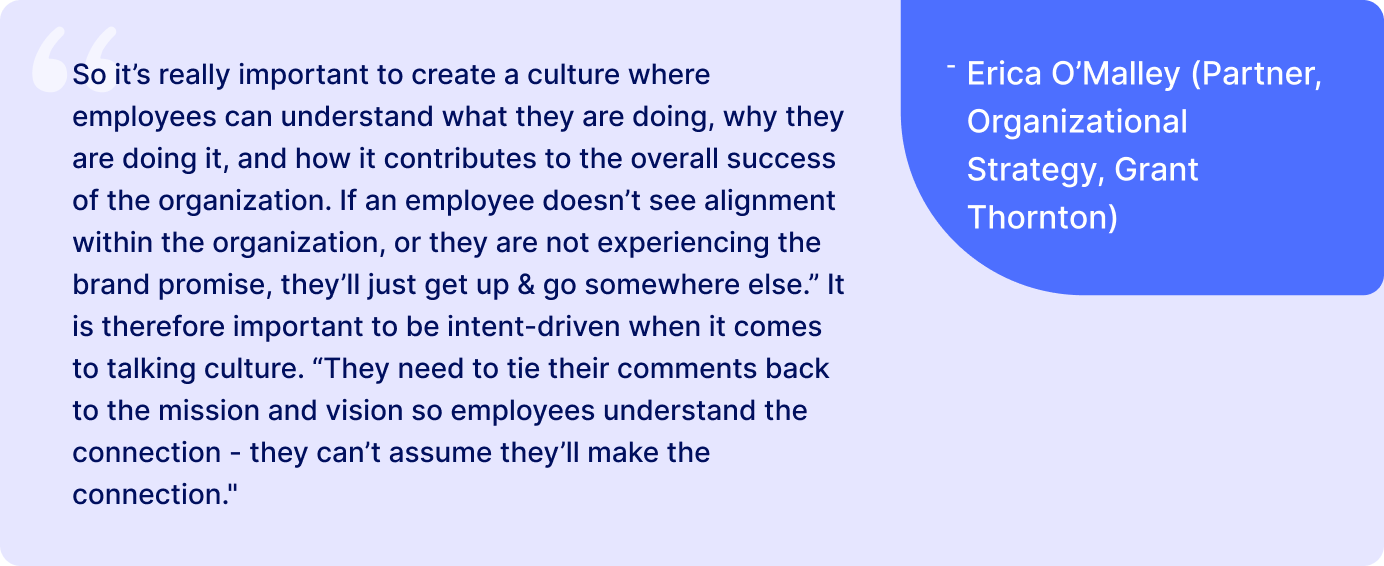
4. Don’t overcomplicate
“If you can't write your values and culture down in a few words, it's probably too complex to understand.” - Josh Bersin
Some of the greatest culture stories of our times have thrived on simplicity, such as Apple's credo of THINK DIFFERENT, or IBM's motto of, simply, THINK.
According to a report by Josh Bersin, over 60% of companies surveyed in a study felt 'overwhelmed' by the deluge of culture messages they get at work and the sheer volume of culture activity they are required to participate in. This can be counter-productive, risking all kinds of unwanted responses from puzzled irritation to downright alienation.
Thankfully, the solution isn't rocket science: It's easier to remember rules when the rules are simple. When you make your big vision real, it's easier to identify with it. Therefore, people leaders must shave the fat and present a lean, uncluttered, and clear representation of your 'next culture framework' - from what it stands for to what it expects from each player.
From worker morale to team productivity to compliance, paring down your culture code to relatable and straightforward terms can elevate and accelerate nearly every aspect of the culture remodeling curve.
5. Redesign the work matrix
Not just people: Your systems, structures, frameworks, and processes must all be 'tuned' to support the aspirational culture - instigating adoption and nudging desired behavior at every bend and turn.
From reviewing the ratio between centralization: decentralization to building workflows that embody and reward culture attributes, systematizing coaching and workshops, and conducting regular performance management where cultural attributes are underscored, celebrated, and incentivized, organizational and workplace design has a telling impact on how quickly, profoundly, and lastingly your culture code is accepted by employees and extended channels.
Employ design thinking at scale to re-engineer your workplace design. Here are some ways you can do that:
- Examine the way employees work and behave - making sure to factor in an inclusive cross-section of workers in your study, straddling function, hierarchy, and geography.
- Visit external workplace review sites like Glassdoor for insights and recommendations by workers who are not forthcoming within the organization.
- Analyze needs, challenges, and habits to simplify work patterns, thereby building efficiency.
- Create Use-Case type 'journey maps' by constructing worker personas.
- Engineer a shared cultural experience across a segmented workforce by leveraging technologies.
- Identify and nurture subcultures and culture clusters (embedded with the system) aligned with the big journey, and carry the spark to take the business forward.
- Identify and prevent damage from culture risk.
- Integrate learnings into the daily cycle to build productive, purpose-first, and meaningful workflows.
- Blend-in incentive and rewards matrices strategically into the flow of work at every step.
- Enlist C-Suite support to drive adoption.
- Continuously build capabilities and reinforcing mechanisms to extend organizational culture.
- Keep tracking, measuring, and refining the employee experience to continually shape the right culture for your current people and desired future.
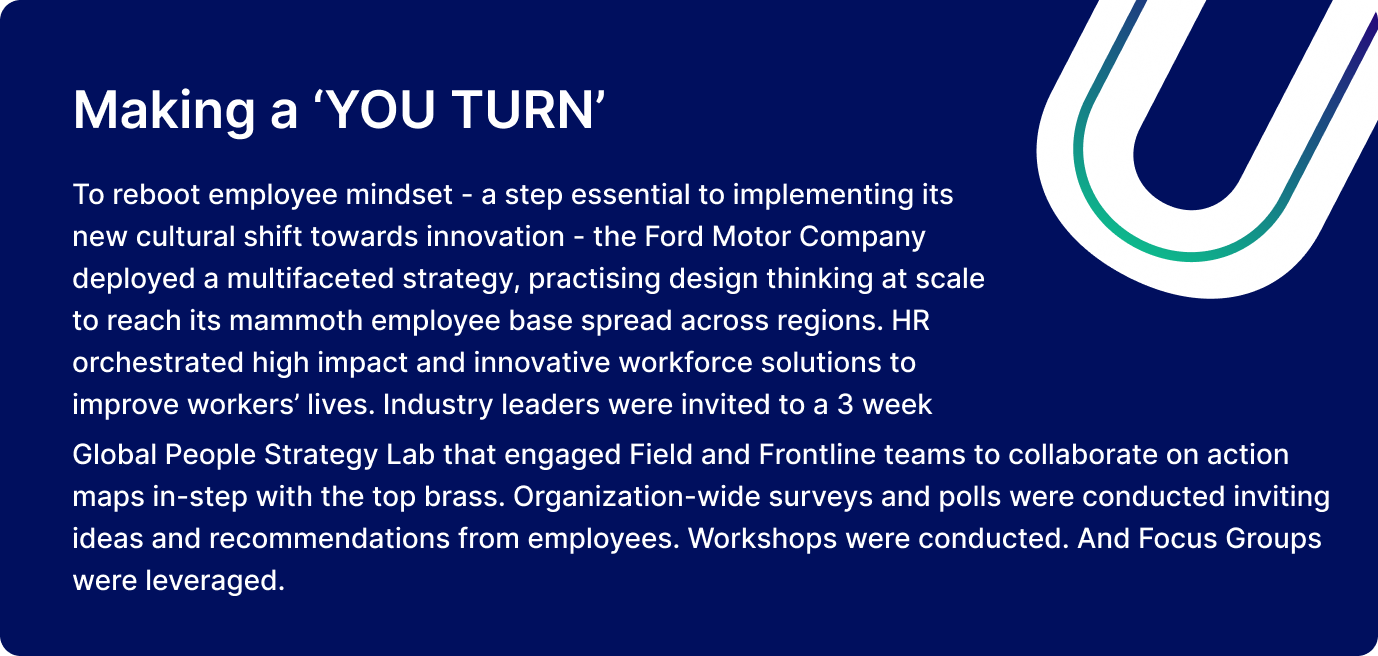
6. Encourage interaction
Forging connections, encouraging collaboration, and promoting communication between employees and teams is a powerful catalyst for alignment, morale, and performance - all of which are key Culture KPI's.
Healthy interaction builds efficiencies by allowing for a free exchange of ideas, gathers everyone on the same page by bringing the team closer, and prevents breakdowns due to faulty communication.
A 2023 study found that while more managers (than ever) care about the growth and betterment of their employees, fewer employees (than ever) are aware of development opportunities available to them within the organization. This squarely points to a gap in the communication process. How can you bridge it? Here's a quick map:
- Be honest (to pre-empt confusion in the bud).
- Listen with empathy.
- Document every idea and message.
- Encourage kind candor at the workplace and encourage teams to back themselves and take big decisions.
7. Hire for ‘culture add’, not ‘culture fit’
The notion that we must hire workers who subscribe to our mission and motto, while a powerful one, is gradually falling out of favor with talent prophets.
For one thing, it is too idealistic a concept: expecting an outsider to match an insider wavelength - sneeze for sneeze - may be asking for too much. Secondly, the approach puts the organization at risk of missing out on top talent.
Finally, 'birds of the same feather,' as it were, may lead to 'output of the same color' every time, robbing business outcomes of crucial elements like variety, range, and depth.
Hiring for 'Culture Add' instead of 'Culture Fit' instantly solves all three bottlenecks. A culture adds approach is about staying loyal to your roots while being receptive to new thoughts. It loosens and relaxes the hiring approach, judging candidates on how they can 'enrich' the existing culture instead of simply complying with it.
As you start engaging with candidates from diverse talent pools and lakes, you take vital steps to fostering an environment of diversity and inclusion (D&I), which directly and measurably affects performance drivers such as creative thinking, problem-solving, and decision making.

8. Go big on EX: Employee experience
Global semiconductor and software design company ARM has combined diverse elements of its workforce experience - including workspaces, shared services, people tech, mobility, and travel - under a single function to create a holistic and consistent experience for its workers.
Nothing works if your people don't. Therefore, to ignite your culture, you must make your workers the heroes around which you design your workplace and workflow.
With a majority of leaders believing that they are putting in the hard work - and yet only about half of the employees believing that their leaders are genuinely invested in them (be it their condition, future, or culture), there is a clear gap which, if left unattended, can genuinely hurt the business.
Indeed, a Gartner study revealed that no more than 13% of employees are truly and fully fulfilled with their experience. Here's how leaders can amp up their employee experience by blending psychological, motivational, and social principles. Remember to keep it personalized, playful, and consistent as you go about it.
The trick to engaging an employee is to figure out the right psychological buttons to press. Humans are stimulated by two kinds of motivational drivers - intrinsic and extrinsic.
Extrinsic motivations - which primarily deal with 'universal triggers' like money, fame, and status - are easier to understand and leverage. And while they are an important component of the motivational matrix, it is Intrinsic Motivation - which deals with natural impulses and deep-seated interests - that is the X-Factor in the equation.
When businesses manage to design a workspace that bridges the organizational goal with the intrinsic motivations of their employees, they open hidden floodgates of energy and creativity no strategy can, ratcheting up performance by several levels.
Offer supplemental programs and workshops - around themes like stress, good habits, nutrition, financial planning, family counseling, grievance planning, and others - to improve life-work balance and boost physical and mental fitness. The effects show clearly: "The financial planning and budgeting class saved my marriage," and "I have become a better father since I started working here" are the exact words shared by employees when BambooHR planned such interventions.
Health Catalyst helped an employee build a controlled living environment for their infant child born with a rare immune deficiency. And when an employee at BAF was in a terrible auto accident, the company moved them from a third-floor apartment to a first-floor one in the same building, placing possessions just as they had been before and providing technology to stay connected during the recuperation process.
A culture that gives employees a strong sense of belonging is built on the pillars of respect and fairness. To start with, decentralize the power equation by shifting some of it in the hands of your workers and employees.
Give them a stage to shine by aligning their role with their acumen, listen to their story, give them a voice by including them in the decision making process, help them raise their game by connecting them with experienced seniors for 'real-time nudging and coaching,' allow them the time and space to take on new projects they're passionate about and never lose an opportunity to acknowledge their contribution to the common cause.
Most importantly, design an incentive-reward matrix that acknowledges involvement, applauds the effort, and rewards achievement: commensurately, memorably, and on time.
Pure Insurance, on its part, takes a more external approach through its Passion Program, giving employees $1,500 every year to pursue whatever they want.
Keep checking for the pulse: Deploy surveys and focus groups strategically
Culture surveys measure the extent to which a team's behavior syncs with its expressed set of values, persona, and purpose. The idea is to map the organization's human frameworks with its strategy and decode its impact on the business plan and bottom line.
Culture surveys act as a compass and alarm clock, reminding people leaders where they are doing well, gaps they need to address, and lacunae where effort and intent can be improved.
Designing a culture survey scientifically is critical to getting the maximum out of it. Some of the thumb rules to be borne in mind while designing one for your teams are:
- Asking questions about observable and measurable behavior instead of views and opinions.
- Including questions that have a direct correlation with the organization's performance.
- Avoiding the urge to combine disparate topics in one question.
- Framing a good percentage of questions for which the answer is negative (which, psychologically, makes people think 'twice' before responding).
- Refraining from using terms and concepts that are too pungent.
- Using a scaling/ranking system that is uniform and consistent throughout.
Don't stop at culture surveys though. Follow them up with focus groups, which can supplement the quantitative data of a survey with insights that are more qualitative and sophisticated in nature.
To ensure your survey is productive, follow some time-tested techniques like setting clear goals and rules, selecting participants and team facilitator/moderator judiciously, and always being around to tweak and control the conversation so that the narrative doesn't go off the guardrails.
Empuls: Where culture meets engagement
Great workplaces don’t just happen—they’re built with intention. A strong organizational culture isn’t about fancy perks or corporate buzzwords; it’s about how employees feel, connect, and engage every day. That’s where Empuls comes in, helping businesses shape culture from the inside out.

Forget transactional work environments. Empuls makes recognition, communication, and engagement effortless, turning workplaces into communities where employees aren’t just showing up—they’re thriving. With a blend of rewards, peer recognition, feedback loops, and transparent communication, it creates a culture that keeps people motivated and invested.
✔ Recognition that feels real – Move beyond yearly awards with everyday appreciation that actually matters.
✔ A voice that’s heard – No more surveys collecting dust—Empuls turns feedback into real change.
✔ Conversations that connect – An interactive social intranet keeps teams engaged, no matter where they work.
✔ Rewards that motivate – Personalized incentives show employees that their contributions count.
✔ A culture that sticks – Keep employees engaged, connected, and aligned with company values.
For companies looking to do more than just talk about organizational culture, Empuls makes it actionable. Because when employees feel valued, work stops being just a job—it becomes a place where people grow, contribute, and belong.
Build the journey, not the destination.
A great culture will eventually amp up your business performance, but to start by focusing on the performance is to put the cart before the horse. Experts say focus on creating a growth environment, and the performance will build itself.
When you focus on results and impact (performance) without creating a psychologically conducive playground, you set up a 'win at all costs' framework were fears, insecurities, and weakness drive action and decision.
On the other hand, when you focus on building a culture of 'growth,' you set people at ease and encourage them to look past shortcomings into how they feel about their role, their work, and their workplace in general.
This will encourage them to reset perspectives, engage with their environment and align themselves with the team goal, generating a climate of honesty, teamwork, and fulfillment. The result? Productivity rises on its own.
Nurture a growth culture by cobbling together a customized mix of individual elements and organizational components - such as psychological safety, continuous learning, collaboration and co-creation, open communication, spontaneous feedback, personal accountability, vulnerability, diversity, and a set of strong, shared values.





